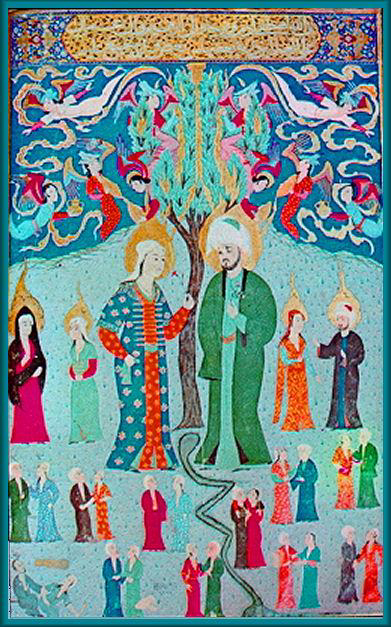
The narrative of Adam and Eve is one that transcends cultures and religions, finding unique representation within Islamic theology that both contrasts with and enlightens the more widely known Biblical rendition. This essay explores the Islamic account of Adam and Eve, emphasizing a contemporary, scientific, and rational understanding that aligns with the principles of Islamic thought. It particularly focuses on their story of disobedience, the actual location of the incident, and the implications for understanding human origins in Islam.
Disobedience and Rationality: Revisiting the Garden
slamic texts describe the incident of disobedience involving Adam, Eve, and Iblis (Shaytan) in a manner that prioritizes moral lessons over literal historicity. Critically, the Quran places this event in a garden on Earth, not in heaven, challenging common misconceptions that stem from conflating Islamic narratives with Biblical ones. The presence of Shaytan in this story is pivotal; his access to the garden directly contradicts the notion of a heavenly setting, as Islamic theology asserts that Shaytan is barred from heaven due to his defiance against God. This detail is not just theological but also embodies a rational approach to understanding sacred stories, emphasizing that divine narratives must cohere with logical principles within Islamic belief systems.
The Origins of Humanity: Beyond Adam and Eve
One of the most profound departures from biblical tradition in Islamic thought is the origin of humankind. Contrary to the Biblical account, which suggests Eve was created from Adam’s rib, Islamic teachings do not explicitly support this view. Instead, the Quranic narrative positions Adam as the first Prophet and a foundational figure for homo sapiens, marking a significant distinction in the understanding of human beginnings.
The Islamic narrative does not imply that Adam and Eve were the first humans in a biological sense but highlights their spiritual significance as the initiators of a lineage that would carry prophetic knowledge. This perspective allows for the integration of evolutionary theory with divine creation, acknowledging that while Adam holds a special status, his existence complements rather than contradicts scientific understandings of human evolution.
Genetic Selection and Moral Diversity
The story of Adam and Eve’s offspring, including their sons, offers insights into the Islamic view of human nature and morality. The narrative suggests that while divine guidance was bestowed upon Adam, Eve’s contribution to their lineage did not include the prophetic gene, thus introducing genetic diversity amongst their descendants. This aspect of the story can be interpreted through contemporary understandings of genetics and human behavior, where both virtuous and malevolent dispositions emerge, highlighting the complex interplay between divine influence and human free will.
Conclusion: Embracing Islamic Rationality and the Natural World
The Islamic narrative of Adam and Eve encourages a reflective and rational approach to understanding our origins, one that respects both divine revelation and the empirical truths of the natural world. It is crucial, therefore, to distinguish Islamic perspectives from Christian narratives, recognizing the unique theological and rational framework Islam provides for interpreting these ancient stories.
In embracing this approach, we can appreciate the depth and complexity of Islamic teachings on Adam and Eve, which not only align with contemporary scientific and rational thought but also offer meaningful moral and spiritual lessons. Islamic theology, thus, advocates for contemplation and rational inquiry, principles that harmonize with our understanding of the universe and our place within it.


